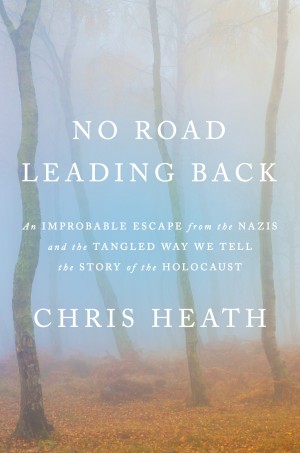Some Holocaust books start with questions: what happened to my great-aunt’s family? How did my relatives reach Brazil? Silvia Foti takes a different approach. The very title she devised for her book tells everyone her conclusions about what happened: yes, her grandfather was a Nazi and a war criminal. She’s also emphasizing that this book is about herself, the granddaughter, and her process of accepting these terrible truths.
Foti opens by introducing herself — she’s a middle-aged woman deeply embedded in the Chicago Lithuanian community. On her deathbed, her mother made her promise to finish the book she had spent a lifetime writing on Silvia’s grandfather, Jonas Noreika, a larger-than-life hero of the Lithuanian resistance in WWII, executed by the Bolsheviks. Foti feels inadequate for the task in so many ways. Noreika is a highly revered freedom fighter in her family, in Lithuania, and in the Lithuanian diaspora. She has no experience writing a biography, much less the hagiography this figure demands. The inevitable avoidance sets in. She takes writing courses, changes jobs, goes on a dry run to Lithuania to bury funeral ashes…and then finally commits to making a dedicated research trip to discover the real story of her grandfather.
In Lithuania, she finds markers of her grandfather’s heroism (plaques on street corners, buildings named in his honor) plastered everywhere. Lithuanian officials read her the official accounts of his heroism. Dying war buddies sing his praises. She interviews his surviving associates and family members, before meeting with Holocaust researchers and historians. Very slowly, she begins to notice inconsistencies, details that tell a different story. Yes, the Nazis imprisoned Noreika and other Lithuanians in the Stutthof camp, but then he was made a ‘prisoner of honor,’ and accorded unusual luxuries. Was it a coincidence that Noreika acquired a grand house and furnishings the day after the mass murder of Jews in the town he directed? And then, even more damning — she saw Noreika’s own signature on the orders removing Lithuanian Jews to the ghettos for extermination.
As Foti doggedly continues her interviews, readers begin to wonder how much evidence she really needs to accept that Jonas Noreika was an antisemite who used anti-Bolshevik rhetoric to annihilate Jews. Eventually, Foti does realize that her grandfather was wiping out thousands of Jews even before the Nazis invaded Lithuania. But this process she goes through, moving from idolizing her grandfather to accepting that he was a war criminal, might be the real value of this narrative. Realizing his guilt also means realizing that ‘good’ Lithuanians were — and are—willing to deny that they hated and resented their Jewish neighbors, that they were willing to march them into the woods and shoot them by the thousands, that they were willing to wear these dead Jews’ clothes and move into their homes. For Foti, it’s a search for the story of her grandfather; for her readers, it’s a deep dive into the mindset of Holocaust denial, and the difficulty of accepting ugly truths.
This book is a struggle, but a worthwhile struggle.
Bettina Berch, author of the recent biography, From Hester Street to Hollywood: The Life and Work of Anzia Yezierska, teaches part-time at the Borough of Manhattan Community College.




